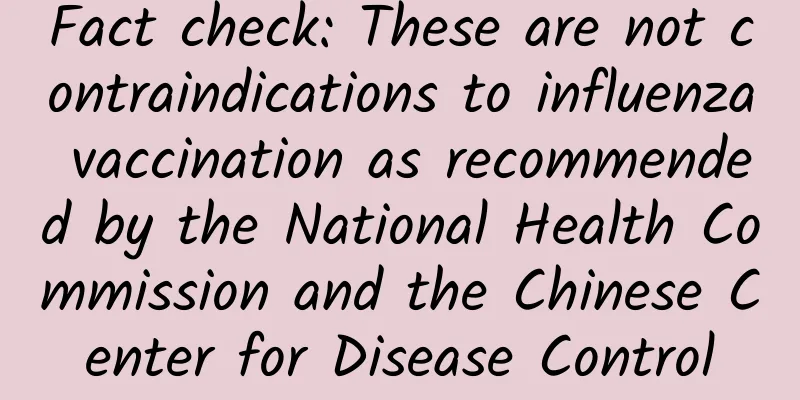Fact check: These are not contraindications to influenza vaccination as recommended by the National Health Commission and the Chinese Center for Disease Control

|
Recently, influenza has been prevalent, and many people have been rejected by vaccination agencies due to " non-existent contraindications ". Seeing people being rejected for these reasons and then privately messaged to ask these questions every day makes my head hurt. Here, I would like to clarify that these are not contraindications, and you should communicate with the vaccination agency with reason and evidence (sometimes you cannot communicate, you should also understand): 1. Egg allergy/never eaten eggs (for example: the picture below) Flu vaccinations can be given normally. ① China's Pharmacopoeia of the People's Republic of China (2015 and 2020 editions) does not list egg allergy as a contraindication to influenza vaccination; ② Since 2016, the U.S. Advisory Committee on Immunization Practices (ACIP) has recommended that people who are allergic to eggs "can" get the flu vaccine, and starting with the 2023-2024 flu season, no additional safeguards are needed; Image source: pexal ③The "Technical Guidelines for Influenza Vaccine Immunization in China" clearly states that " egg allergy will not be used as a contraindication to influenza vaccination." Summary: Whether or not a child is allergic to eggs or has eaten eggs before, there are no contraindications to influenza vaccination and vaccination can be carried out normally. 2. Menstruation/pregnancy/pregnancy/breastfeeding (for example: the picture below) You can get the flu vaccine, but it depends on the situation: ① Menstrual period/pregnancy preparation period: There is no document stating that menstrual period and pregnancy preparation period are contraindications to vaccination; ② Pregnancy: The "Technical Guidelines for Influenza Vaccination in China" states: A large number of studies at home and abroad have confirmed that pregnant women are at higher risk of severe illness, death and adverse pregnancy outcomes after contracting influenza. There is sufficient evidence abroad for the safety of influenza vaccination for pregnant women at any stage of pregnancy, and the vaccine is clearly effective in preventing pregnant women from contracting influenza and protecting infants under 6 months of age through fetal antibodies . In addition, the guidelines clearly state that "it is recommended that pregnant women can receive influenza vaccination at any stage of pregnancy"; ③Breastfeeding: The U.S. Centers for Disease Control and Prevention (CDC) clearly states that influenza vaccination is safe for "breastfeeding women" and their infants 6 months and older. In fact, women who receive influenza vaccination during pregnancy or breastfeeding will produce antibodies against influenza, which they can share with their infants through breast milk . China's "Expert Consensus on Informed Informal Information on Immunization (Part 2)" clearly recommends that influenza vaccines should not be given directly to infants under 6 months of age. This group can prevent influenza by vaccinating the mother during pregnancy and breastfeeding and by vaccinating the infant's family members and caregivers. Image source: pexal It should be noted that influenza vaccination can be given during menstruation, pregnancy preparation and breastfeeding as long as there are no allergies or severe physical discomfort. However, due to domestic instructions (some instructions list it as a contraindication), concerns about medical disputes (vaccination units are worried that suspected abnormal reactions to vaccination will occur after vaccination, which will affect the vaccine recipient and their families), and insufficient local data in the mainland (due to ethical and enrollment difficulties), very few vaccination units give influenza vaccines to pregnant women during pregnancy. In addition: The influenza live attenuated vaccine is contraindicated during pregnancy, but because it is only approved for children up to 17 years old in China, theoretically there is no need to worry too much, although... 3. The interval between the last influenza vaccination and the last influenza vaccination is less than 1 year (for example: the picture below) It does not need to be a full year. ① The "Technical Guidelines for Influenza Vaccination in China" clearly states: In order to ensure that recipients are immune before the peak influenza season, it is recommended that local areas arrange vaccination "as soon as possible" after the vaccine is available, and it is best to complete the vaccination before the local influenza epidemic season; in the same influenza epidemic season, people who have completed the full vaccination according to the vaccination procedure do not need to be vaccinated again; ② Some people may need to receive "2 doses" of flu vaccine in the same flu season, including: a. People aged 6-35 months "Annual vaccination" - Influenza vaccine instructions in my country b. Annual vaccination for people aged 6 months to 12 years old - Ministry of Health, Labor and Welfare of Japan c. "First influenza vaccination" for 6 months to 8 years old - World Health Organization, national guidelines d. People of any age receiving influenza vaccination for the first time after a hematopoietic stem cell or solid organ transplant - Australian Immunisation Handbook e. Some people who have to pay for 2 or more injections themselves - I won't single them out... In short, the requirement that the interval must be at least one year is a kind of imagined hysteria. Of course, it cannot be ruled out that the system in some areas may be stuck and not provide vaccinations. Appropriate complaints can be made (not against the vaccination unit, but against the exemption system). willing =Pill= Disclaimer: This article was created out of personal interest, only to help more ordinary people have a clearer understanding of vaccines. The content and views do not represent any organization, unit, or institution, and it has not accepted any form of sponsorship. All pictures are from public online platforms. If the content is incorrect, please do more self-criticism (not). |
<<: How to protect liver and gallbladder in daily life
>>: Wisdom of Traditional Chinese Medicine: New Exploration on Treatment of Diabetes and Obesity
Recommend
Don’t ignore it anymore! Oral health is very important, you need to know this!
My dear children, do you usually only pay attenti...
The specific time of women's safe period and dangerous period
Many friends may not understand about women's...
What should I do if I have sex before my period is over?
Menstruation is a reaction that arrives on time, ...
Is it normal for vaginal discharge to have a slight fishy smell?
Leucorrhea is a special substance produced by the...
38 weeks pregnant right side abdominal pain
Many pregnant women who are 38 weeks pregnant hav...
Will boys be annoyed when girls keep sending messages? What are the techniques to guide boys to take the initiative to chat?
In the process of dating, boys and girls are a ve...
The success rate of medical abortion at 40 days of pregnancy
Many female friends think that medical abortion c...
What is the reason for irregular menstruation?
A woman’s menstrual period can actually reflect h...
Some reasons why vaginal discharge is pink
What's going on with pink leucorrhea? In fact...
What to do with postpartum pelvic pain?
It is very common to experience pelvic pain after...
Is it normal to have menstruation 20 days after abortion?
The incidence of spontaneous abortion is also ver...
Left lower abdominal pain during ovulation
Generally speaking, if a woman's menstrual cy...
What to do if a girl looks bad
A person's bad complexion will affect his or ...
Why are the Three Kingdoms called Wei, Shu and Wu? Who was the King of Wei during the Three Kingdoms period?
The Romance of the Three Kingdoms is a long histo...
How is HPV16 positive?
For everyone, any test result showing positive is...









